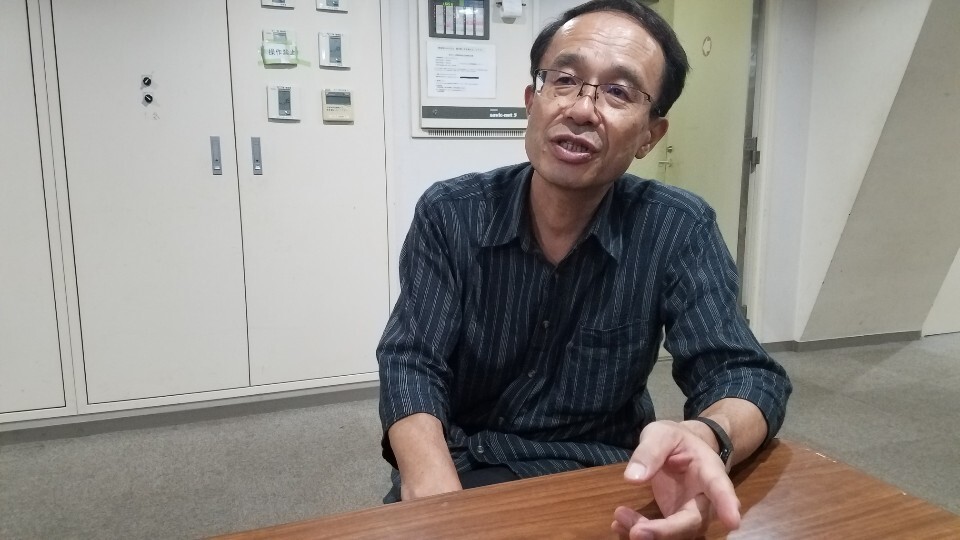hankyoreh
Links to other country sites 다른 나라 사이트 링크
[Interview] Japanese historical researcher tackles issue for forced labor

“The biggest problem is the propaganda claiming that Japan has become a victim because of the South Korean Supreme Court’s ruling on compensation for victims of forced labor.”
Japanese modern history researcher Yasuto Takeuchi noted this in response to the Abe Shinzo administration’s claim that the South Korean Supreme Court’s judgment on compensation for victims of forced labor was a violation of international law. Takeuchi took part as a panelist in a symposium hosted by “Tokyo Candlelight Action Against Yasukuni” (Yasukuni is a shrine that serves homage to Japanese war dead, including war criminals) on Aug. 10 at the Korean YMCA in Chiyoda, Tokyo. In an interview with the Hankyoreh after his presentation, he said, “Even if it is belated, the Japanese government should acknowledge the illegality of the colonial occupation and step up to take action to solve the issues that remain unaddressed under the 1965 Treaty on Basic Relations.” Takeuchi has researched the issue of forced labor for 30 years, and written a four-book series called, “An Investigation into the Forced Labor of Koreans.”
“The Abe administration claims that the Supreme Court decision is a clear violation of the treaty, has destroyed the legal foundation of Korea-Japan relations, and represents a challenge to the post-war international order,” Takeuchi said. “This view is rooted in an attitude that makes no attempt to reflect on Japan’s history of colonial occupation, instead engaging in retaliatory economic measures and viewing Korea as a country that must be made to submit.” His analysis of negotiation documents between Korea and Japan prior to the signing of the treaty found that the treaty should be interpreted as “primarily an issue related to property claims.” Although Japan attempted to do away with any right of claim for individual compensation at the time, Takeuchi believes that “in theory, these rights cannot be eradicated” because the right of claim is part of an individual’s basic rights.
Takeuchi has long investigated Korean victims of forced labor in Japan and pointed out that there are problems with some of the ways Koreans talk about forced labor. “Koreans often think that the Korean people whose remains are returned by Japan were all victims of forced labor. Some of the remains, however, are of those who went to Japan after the end of the war [World War II]. Not all of them were forced laborers. In Korea, some people suggest that 40,000 Koreans were forced into labor in Takashima Mine, which is near Hashima Island (also called Gunhamdo, or Battleship Island), but, actually, a more realistic estimate is just 4,000 people. Right-wingers pick out mistakes like this to argue that the entire narrative is untruthful. This means that we have to be careful about the facts we use,” he said.
Takeuchi also responded to testimony made by Hashima Island residents, and promoted by private conservative organizations in Japan, that relations between Koreans and Japanese laborers were “good” and that there was “no discrimination.” “Of course the relationship between kids and between some laborers was good.
However, to suggest that was the entire story conceals the fact that the state forced Koreans into labor and ignores the fundamental issue that they weren’t allowed to leave the island,” he said.
Takeuchi also added, “Forced labor is not a problem of numbers. It has to do with people’s lives. It took away people’s futures. The Japanese government says that the problem has already been resolved, but an investigation into the truth and recovering the dignity of the victims is the only way to genuinely resolve the problem in my opinion.”
By Cho Ki-weon, Tokyo correspondent
Please direct comments or questions to [english@hani.co.kr]

Editorial・opinion
![[Editorial] Penalties for airing allegations against Korea’s first lady endanger free press [Editorial] Penalties for airing allegations against Korea’s first lady endanger free press](https://flexible.img.hani.co.kr/flexible/normal/500/300/imgdb/original/2024/0502/1817146398095106.jpg) [Editorial] Penalties for airing allegations against Korea’s first lady endanger free press
[Editorial] Penalties for airing allegations against Korea’s first lady endanger free press![[Editorial] Yoon must halt procurement of SM-3 interceptor missiles [Editorial] Yoon must halt procurement of SM-3 interceptor missiles](https://flexible.img.hani.co.kr/flexible/normal/500/300/imgdb/child/2024/0501/17145495551605_1717145495195344.jpg) [Editorial] Yoon must halt procurement of SM-3 interceptor missiles
[Editorial] Yoon must halt procurement of SM-3 interceptor missiles- [Guest essay] Maybe Korea’s rapid population decline is an opportunity, not a crisis
- [Column] Can Yoon steer diplomacy with Russia, China back on track?
- [Column] Season 2 of special prosecutor probe may be coming to Korea soon
- [Column] Park Geun-hye déjà vu in Yoon Suk-yeol
- [Editorial] New weight of N. Korea’s nuclear threats makes dialogue all the more urgent
- [Guest essay] The real reason Korea’s new right wants to dub Rhee a founding father
- [Column] ‘Choson’: Is it time we start referring to N. Korea in its own terms?
- [Editorial] Japan’s rewriting of history with Korea has gone too far
Most viewed articles
- 160% of young Koreans see no need to have kids after marriage
- 2[Editorial] Japan’s rewriting of history with Korea has gone too far
- 3[Reporter’s notebook] In Min’s world, she’s the artist — and NewJeans is her art
- 4Hybe-Ador dispute shines light on pervasive issues behind K-pop’s tidy facade
- 5[Editorial] Penalties for airing allegations against Korea’s first lady endanger free press
- 6Presidential office warns of veto in response to opposition passing special counsel probe act
- 7Vietnamese war victims speak of sexual violence by S. Korean troops for the first time
- 8[Column] Park Geun-hye déjà vu in Yoon Suk-yeol
- 9Months and months of overdue wages are pushing migrant workers in Korea into debt
- 10The BTS story that no Koreans would have believed a generation ago